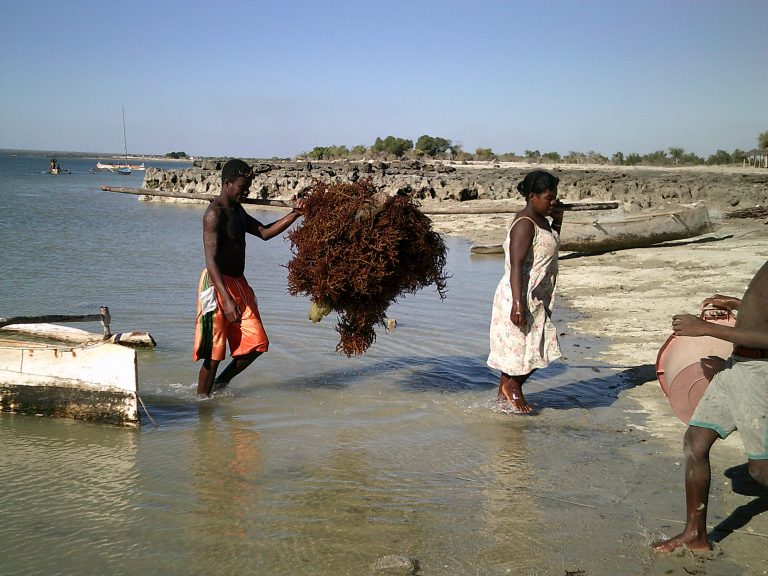New research highlights local recognition of the economic and social benefits of sustainable community-based aquaculture (CBA) in southern Madagascar.
The study, by researchers from the University of Edinburgh and Blue Ventures, showed that seaweed and sea cucumber aquaculture has provided more predictable and safer income opportunities for low-income communities, compared to fishing.
The researchers used Photovoice − a participatory photography-based methodology − to explore local perceptions of aquaculture benefits within the Velondriake Locally Managed Marine Area (LMMA). The project provided digital cameras to 18 people, including seaweed and cucumber farmers, to document key issues affecting their community. Community members captured more than 300 photos, which formed the focus of in-depth discussions around how these aquaculture initiatives have impacted their lives. Results, published in the journal Ocean and Coastal Management showed that participants recognised that community-based aquaculture has provided more predictable and safer income opportunities compared to fishing.
“Many people are interested in being a farmer because they know [they will receive] a lot of benefits from this work,” said one research participant.
Unlike conventional forms of aquaculture which are typically large-scale, and often highly unsustainable, community based seaweed and sea cucumber farming does not require any feed inputs, and has no adverse impacts on the surrounding ecosystem. By working as aquaculture farmers, communities can reduce their dependence on fishing while earning a more sustainable and reliable income.
The research was carried out in the small fishing village of Tampolove, which has fewer than 500 residents. It is one of 33 villages within the 600km² Velondriake LMMA − one of more than 170 such community conservation initiatives around Madagascar’s coastline. People in this arid region are mostly small-scale fishers who live in extreme poverty. They rely on fisheries for their daily food, living, and also cultural identity, which are now threatened by declining fish stocks.
Local communities, with support from Blue Ventures, Ocean Farmers, and Indian Ocean Trepang, established aquaculture initiatives within the community conservation area to diversify incomes and reduce fishing pressures. Participants emphasised that aquaculture farmers were earning additional incomes that increased their resilience by enabling them to buy goods, save, and invest. Community members also noted that since becoming aquaculture farmers, they fished less and were less likely to risk fishing in poor weather. These insights emphasise the important role that aquaculture can play alongside community-based marine conservation, providing more reliable and safer livelihoods for coastal communities.
“All too often academic research is done ‘on’ communities, not ‘with’ them,” said lead researcher Lara Funk. “Using a participatory method such as Photovoice helped to shift this dynamic by creating a platform for community members to share their perceptions. This participatory approach is aligned with Blue Ventures’ community-based model which advocates for and supports local communities.”
Photo: Seaweed farmers in Tampolove, Madagascar, bring their harvest to shore. Photo credits: Photovoice participant.
Read the full article: Perceptions of access and benefits from community-based aquaculture through Photovoice: A case study within a locally managed marine area in Madagascar.
Find out more about Blue Ventures’ work on exploring aquaculture as an alternative to fishing.
Read Blue Ventures’ publication about community-based aquaculture.
This work was funded and supported by the University of Edinburgh, Blue Ventures, and the Prince Albert II of Monaco Foundation.
The corresponding author, Lara Funk, can be reachable at [email protected] at Heriot-Watt University.























